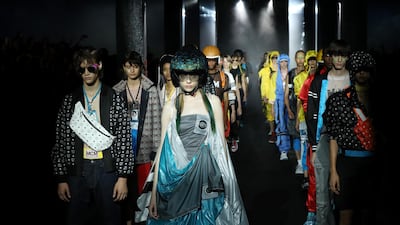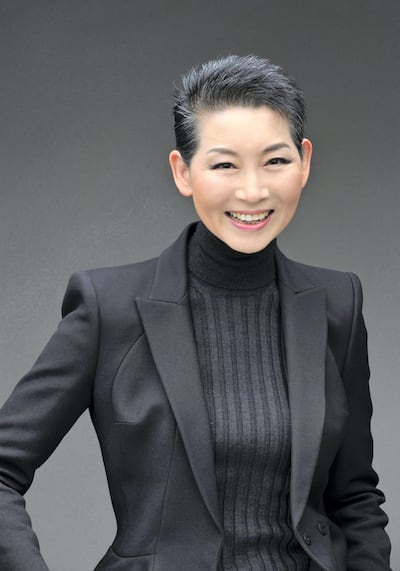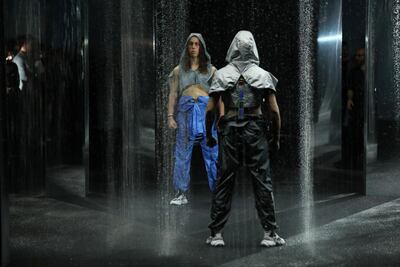Every fashion season offers up new buzzwords, most of which are instantly forgettable, but this season’s hot term – disruption – feels particularly apt.
At a time when designers are jumping from label to label (Virgil Abloh to Louis Vuitton and Kim Jones to Dior, for example), women’s brands are launching men’s lines (Celine and Maison Margiela) and shows routinely have boys and girls on the same runway regardless of the season (Prada and Gucci), it does indeed feel like we are in the midst of a seismic fashion shift.
One person at the forefront of this shift is not a fashion designer, nor a millennial or even an influencer, but the supremely elegant Korean businesswoman Kim Sung-joo. A self-made woman, she is the founder and chairperson of Sungjoo Group, and chairperson and chief visionary officer of MCM, which operates 500 stores across 40 countries, with 60 stores in China alone. Communicating daily with 15 offices worldwide, Kim explains that the old business model of one boss having centralised control is no longer relevant in today’s workplace.
“We have 37 nationalities with different cultures and in different time zones, but I don’t even have an office,” Kim tells me. “I gave it up and told the team to use it as a meeting room. My office is wherever I am.”
With a degree in sociology from Amherst College, a master’s in international relations from the London School of Economics, and another master’s in business ethics and economics from Harvard University, Kim’s background falls more in the sphere of social sciences than fashion, which gives her a very business-focused view of the industry. “I see consumer marketing much more from an analytical socio-economic and social-political point of view,” she explains, “rather than just that a designer is hot property.”
Despite years of hard study and work to get where she is, Kim’s life could have taken a very different path, she says. “I could have had a very comfy and secure life,” she explains. “I am from Korea, which is very heavily patriarchal. It is Confucianism-dominated and it used to be such a chauvinist society – a big boys’ club.”
The youngest daughter of Kim Soo-keon – founder of the hugely successful Daesung Industrial Corporation – Kim had a life of luxury that was, however, steeped in very traditional thinking. “I am from one of the biggest families, but my father didn’t believe women should be in business. So while my brothers inherited a billion-dollar empire each, I was completely excluded.”
There was no discussion about what career path Kim would follow – she was simply barred from working, and instead expected to marry into a wealthy family and devote her life to raising children. "I rebelled against my family. I did not follow the arranged marriage system, and instead married my sweetheart. And that was the moment, in the middle of the 1980s, that my father completely disowned me."
With all links to her family abruptly severed, Kim took the decision to relocate to New York and start afresh. “I wanted to see how far I could go without that support.”
She landed a job at Bloomingdale's and, despite a lack of experience, her astute business acumen soon caught the attention of then-chairman, Marvin Traub, who assigned her to handle the wave of international fashion brands that were then arriving in the United States for the first time. "Bloomingdale's was the channel to bring all the luxury brands from Europe into the American market; it was an excellent training ground for me," she recalls.
Buoyed with knowledge of how to break into new markets, she set out on her own, founding SungJoo Group in 1990, to bring labels such as Marks and Spencer, Sonia Rykiel, Yves Saint Laurent and Gucci into the Korean and wider Asian markets. "I was like a pioneer bringing luxury brands to land on Asian soil, even before China emerged," she says.
In 1992, Kim was approached by the German leather brand MCM, which was looking to introduce its expensive suitcases and handbags into the Asian market. Frank and forthright, Kim wasted no time in telling the Germans that it was going to be hard for them. “I told them: ‘Guys, wake up. You are the latecomers. As a German brand, nobody is going to regard you as a luxury, so why don’t I be your licensee partner.’” It was the beginning of a successful relationship that culminated in 2005, when the Sungjoo Group bought MCM outright. Eleven years later, in 2016, MCM announced plans to double turnover to US$2 billion (Dh7.3bn) within five years, thanks mainly to the 60 per cent of MCM sales that come from the Asian market. “I already knew that Asia was going to become the biggest market, so after we purchased the brand in 2005, I rushed into China.
“Many people say China is just one market. It’s not. It’s a fascinating market, and already stats show that by 2025, the global luxury market is estimated to reach about $350 billion, and about 65 per cent will come from China and millennials.”
Priced in line with Louis Vuitton and Celine, MCM is already at the luxury end of the market, and known for its heavily branded backpacks and bags. Sensing the world of high fashion was in flux, Kim and her design team decided to expand MCM into a fully-fledged lifestyle label, offering ready-to-wear for men as well as women. She also totally rethought the line of bags and accessories. The resulting collection was launched on June 13 at Pitti Uomo in Florence.
Speaking to her in a hotel in Florence ahead of the show, I quizzed Kim on why, in such a busy market, she felt the need for such dramatic expansion? "It used to be that more mature age group dominating the luxury market," she explains. "But now it's a younger group, and it has moved from formal attire to something far more sporty. When you look at the new fashion world, especially in the 21st century – when we talk about millennials and Gen Z – the whole market has been disrupted. The old-school luxury attitude, with a high nose and a high price, and treating people as if they will follow blindly, is over. A new lifestyle is emerging, which I think is no longer about big names, big egotistical brands and big egos just turning up carrying a Birkin… that attitude is really finished. It's not that we are just showing a total look; of course, lots of brands are doing that, but we are showing a new attitude, a new approach, a new concept," she explains.
And what an approach it proved to be. Staged in an old warehouse next to the main train station, MCM’s debut Pitti fashion show opened with two male models standing in sheets of artificial rain. The collection, as it emerged, consisted of men’s and women’s streetwear inspired by the garb of fighter pilots and skydivers. Multilayered, the pieces were very wearable, fashioned almost exclusively in practical, lightweight nylon, festooned with pockets and backpacks designed to keep the hands free. In short, it felt like a wardrobe created for the modern way of living.
“Today the market of social media and millennials, especially in Asia, is a dominant force. Asians have deep pockets and suddenly are becoming the trend leaders. Asian and young people have the technology to live and shop online, and now consumers behave very differently. It’s not about what brand, what design anymore.
"Look at me, I am hands-free," she says, pointing to the MCM bumbag at her waist. "To be hands-free is the future, so we have to be prepared. It used to be design first, then function after, but that is an old attitude. Now function is freedom. If you look at MCM's DNA, we are known for backpacks, not because of its design, but because I knew this global nomad lifestyle was coming – where we will all be moving around. To have two hands free is freedom to move, and I knew this would be our future."
As well as rethinking the strategy of MCM, Kim has also shifted the design studio from its old base of Korea, to Milan. Adamant about bringing more women into the workplace, she jokes about her company only hiring women. “Out of 1,500 colleagues, we are almost 80 per cent women, so I even have to tell my team, stop discriminating against men. In the 21st century, in a knowledge-based economy, only brainpower matters.”
MCM is now listed by Deloitte US as number 66 in a ranking of the world’s 100 top luxury firms, and Kim herself has received countless accolades. In 1997, she was selected as a Global Leader of Tomorrow by the World Economic Forum in Davos, and received the Ethics in Business Award from the European Union in 2009. In 2012, she was included in Forbes’s Top 50 Asian Business Women list. Even the United Nations requested she be part of “Innovation 101” at the Decide Now Act summit, and in 2015, she was awarded an Honorary Officer of the Order of the British Empire by Queen Elizabeth II in recognition of her contribution to strengthening bilateral ties between the United Kingdom and the Republic of Korea.
In addition, inspired by her mother to “succeed to serve”, Kim was appointed head of the Korean Red Cross in 2014, and in 2009 set up the SungJoo Foundation, a charitable body that supports 80 NGOs domestically and internationally, as well as giving $1million to the Global Summit of Women.
However, this is not the only motto that drives Kim. As she explains: “We have three new credos that we try to follow at MCM. First is ‘health is the new wealth’, because wealth is not about how much money you have, but about longevity and a long life. Next is ‘time is the new luxury’ and, finally, ‘creativity is the new power’. We empower our customer to be creative with us. Mix and match, and express your personality. Don’t be dictated to by us.”
___________________
Read more:
Shoenvious: custom-made shoes at the click of a button
Statement jacket celebrates historic day for women in Saudi
Deconstructing the meaning (and brands) in Beyoncé and Jay-Z's music video
___________________



